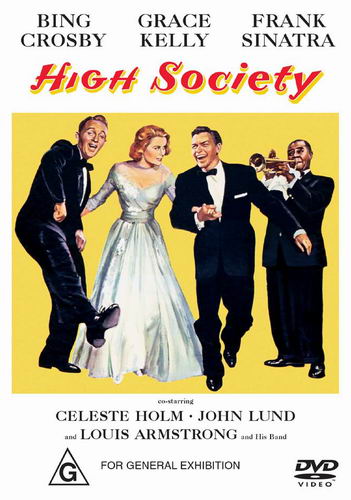Dir. Charles Walters
Starring: Bing Crosby, Grace
Kelly, Frank Sinatra, Celeste Holm
High Society is everything I could ever possibly want from a
musical film. A plot which actually hangs together (not surprising as it is
based on The Philadelphia Story which
starred Katherine Hepburn, Cary Grant and James Stewart). Characters whose
motivations and quirks are believable (ditto). A big name star cast (including
Frank Sinatra, Bing Crosby, Grace Kelly and Louis Armstrong). And a series of
fantastic Cole Porter numbers (such as True
Love, Who Wants to be a Millionaire?
and Well, Did You Evah!). It is, in
every respect, quite positively “yar”. I was tapping my toes from the very
first moment when we are introduced to Louis Armstrong and his real-life band
jamming away happily at the back of a coach en route to the mansion of Bing’
C.K. Dexter Haven. But as ol’ Satchmo says, “End
of song; beginning of story!”
We gather in “Newport, Rhode I” for the wedding of blue-blooded Tracy Lord (the
soon-to-be-blue-blooded Grace Kelly who, by the time the film was released, was
Princess Grace of Monaco). The next day she will be marrying mining heir George
Kittridge (John Lund). All of Newport
Armstrong is actually key to the
success of the mix. He and his band are outsiders to the high society scene he
sings about. This gives him the liberty to be the audience’s eyes and ears,
commenting on the goings-on (“There’s a
dark horse in this here race and my boy’s running a slow third…”). Macauley
and Liz should be outsiders too. They may be quite clear that they do not want
to be a millionaire, but they still get seduced by their surroundings. Liz is
better at warding off Uncle Willy’s roving eye. Mike falls for the beautiful Tracy Newport , and in the process she shows
him the real Tracy
Okay, there’s something worrying
about 26-year-old Kelly being torn between the 40-year-old Sinatra (with his
dyed black hair) and the 53-year-old Crosby (with his thinning hair). But she
has a track record of marrying older men in the movies, as her wedding to Gary
Cooper in High Noon showed. But she
was a casting coup considering her relationship with Prince Ranier. She has a
wonderful wardrobe, she swans around looking stunning and – even if some of her
moves were slightly stagey – she has the skills to be, in turn, cold, angry,
vulnerable and ecstatic. Crosby and Sinatra are the bigger stars, and their
1940s rivalry is even nicely sent up in ‘Well,
Did You Evah!’ when Bing assays a few trademark “boo-boo-boo-boo”s, only to face Sinatra’s snappy “I don’t dig that kind of crooning, chum!”
(“You must be one of the newer fellows” Bing
responds). It was a good addition. The entire number was only added fairly late
on in the game when it was realised that the two male leads did not have a
duet; the last minute addition is one of the film’s stand-out scenes. Frank
also duets with Celeste Holm’s Liz on ‘Who
Wants to be a Millionnaire?’ and Bing doubled up with Louis Armstrong and
his band on the joyous ‘Now You Has Jazz’.
All the way through they seem to be having an absolute whale of a time!
 |
| "Any requests from the back? What's that? Ebony and Ivory?" |
Some characterisation does suffer
in the translation from The Philadelphia
Story. Here Mike is not a frustrated novelist, something that I felt really
added depth to Jimmy Stewart’s character in the original film. However, I
suppose that makes his sacrifice when he and Liz resign their commission the
greater. I could also make the point that, for a musical film, it doesn’t
actually have that many songs in it. The modern stage show has many more. It
does, however, have an overture. You can tell because you get five minutes of
blank blue screen with the word ‘Overture’
written across it. I found that quite annoying. But on the whole High Society is probably the most fun
musical I have seen this year.
“End of story!”
What have I learnt about Rhode
Island?
Rhode Island – and specifically
Newport – is the playground of old money families. Dexter jokes about having a
grandfather who was a robber baron. So these grandees of the Gilded Age
invested their money in the sort of grand mansions seen in the opening number:
grand villas with spacious gardens rolling down to the sea. By the ‘50s however
money was running out. The members of the Newport high society could still
generate headlines, but all across town mansions were being border up or sold
in order to pay taxes. Tracy tells Mike that Uncle Willy was unable to find a
buyer for his estate, so in the end it was cheaper for him to give it away to a
school.
Newport also has a jazz festival.
Dexter is portrayed as a patron of the festival; the impression is that not
many in his circle frequent it (Uncle Willy refers to “Lewis Armstrong”).
Can we go there?
The original tale was The Philadelphia Story and it was –
unsurprisingly – set in Philadelphia. High
Society transplants the action to waterside Newport, Rhode Island. The opening shot gives us an aerial view of several of
Newport’s estates along prestigious Bellevue Avenue. These include Rosecliff, where the ballroom film was shot, and Clarendon Court, later home to Klaus and Sunny von Bülow and which sold for
$13m earlier this year. In general, however, the movie was filmed out west in
Hollywood (oh the shame!).
Overall Rating: 4/5

No comments:
Post a Comment